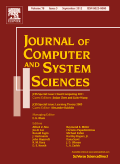
JOURNAL OF COMPUTER AND SYSTEM SCIENCES
Scope & Guideline
Championing cutting-edge research in computational theory.
Introduction
Aims and Scopes
- Algorithm Design and Analysis:
The journal publishes research on novel algorithms, focusing on their efficiency, complexity, and practical applications across diverse domains. - Computational Complexity:
A significant emphasis is placed on exploring the boundaries of computational problems, including complexity classes and algorithmic limitations. - Graph Theory and Combinatorial Optimization:
Research in this area includes studies on graph algorithms, network flows, and combinatorial structures, providing insights into optimization problems. - Automata Theory and Formal Languages:
The journal covers theoretical foundations of computation, including automata theory, grammars, and their applications in computer science. - Distributed and Parallel Computing:
A focus on algorithms and systems for distributed computing environments, including issues of coordination, efficiency, and fault tolerance. - Artificial Intelligence and Machine Learning:
Research that intersects AI and ML with algorithmic foundations, focusing on learning algorithms, prediction models, and their theoretical underpinnings. - Temporal and Dynamic Systems:
Exploration of algorithms and models that deal with temporal aspects of systems, including scheduling, reachability, and dynamic networks.
Trending and Emerging
- Temporal Graphs and Dynamic Networks:
There is a growing focus on algorithms and theories surrounding temporal graphs, which model dynamic relationships over time, reflecting their increasing importance in real-world applications. - Machine Learning and AI Algorithms:
Research integrating machine learning with algorithmic principles is on the rise, as the demand for intelligent systems that can learn from data continues to grow. - Distributed Algorithms in Uncertain Environments:
The emergence of algorithms designed for distributed systems facing uncertainty, such as those found in IoT and cloud computing, is becoming a significant area of exploration. - Parameterized Complexity:
The exploration of problems with parameterized complexity is gaining momentum, as researchers seek to develop efficient algorithms for hard combinatorial problems. - Quantum Computing Algorithms:
With the rise of quantum computing, research on quantum algorithms and their implications for traditional computational problems is increasingly prominent.
Declining or Waning
- Traditional Data Structures:
Research focused on conventional data structures such as trees, lists, and arrays has seen a decline, as newer paradigms and data management techniques gain traction. - Static Graph Algorithms:
Algorithms that do not account for dynamic changes in graph structures are becoming less prevalent, with a shift towards algorithms designed for dynamic and temporal graphs. - Basic Computational Models:
Fundamental models like Turing machines and basic automata are being overshadowed by more complex and practical models that better represent modern computational environments. - Classical Cryptography:
As advancements in quantum computing and new cryptographic methods emerge, traditional cryptographic approaches are receiving less focus in favor of quantum-resistant algorithms. - Simple Approximation Algorithms:
Research on straightforward approximation techniques is waning, as the community increasingly seeks more sophisticated, nuanced approaches that address complex optimization problems.
Similar Journals

THEORY OF COMPUTING SYSTEMS
Fostering Interdisciplinary Dialogue in Computing TheoryTHEORY OF COMPUTING SYSTEMS, published by SPRINGER, is a renowned journal that has been a cornerstone in the fields of computational theory and theoretical computer science since its inception in 1996. With an ISSN of 1432-4350 and an E-ISSN of 1433-0490, this journal is committed to disseminating high-quality research that explores the underlying principles of computing systems and their theoretical foundations. Positioned in the Q2 category for both Computational Theory and Mathematics and Theoretical Computer Science, it plays a vital role in advancing scholarly dialogue and innovation within these disciplines, as evidenced by its rankings within the Scopus index. Researchers and professionals can access this journal in various formats, ensuring that cutting-edge research is readily available for a global audience. With a clear focus on fostering interdisciplinary collaboration and exploring emerging trends, THEORY OF COMPUTING SYSTEMS is essential reading for anyone interested in the evolution of computing theory and its applications.

DISCRETE MATHEMATICS
Navigating the landscape of theoretical computer science.DISCRETE MATHEMATICS, published by Elsevier, is a leading journal dedicated to the field of discrete mathematics and combinatorics, with a distinguished presence in the academic community since its inception in 1971. With an ISSN of 0012-365X and an E-ISSN of 1872-681X, this esteemed journal has firmly established itself within the Q1 category for Discrete Mathematics and Combinatorics, and Q2 for Theoretical Computer Science as per the 2023 metrics, underscoring its pivotal role in advancing research in these vital areas. DISCRETE MATHEMATICS is highly regarded, reflected in its Scopus rankings, where it stands at #44 out of 92 in its primary category, contributing significantly to the global discourse on complex mathematical theories and applications. Published from the Netherlands, the journal serves as a crucial resource for researchers, professionals, and students looking to stay informed about the latest innovations and methodologies in discrete mathematics. Though currently not an open-access journal, DISCRETE MATHEMATICS continues to foster a vibrant scholarly community through rigorous peer-reviewed research, promoting a deeper understanding of the mathematical structures that underpin both theoretical and applied science.
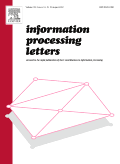
INFORMATION PROCESSING LETTERS
Advancing Knowledge in Information ProcessingINFORMATION PROCESSING LETTERS, published by ELSEVIER and with an ISSN of 0020-0190, is a prominent academic journal that serves as a vital resource in the fields of Computer Science, Information Systems, and Signal Processing, among others. As evidenced by its Q3 ranking across various categories in 2023, including Computer Science Applications and Theoretical Computer Science, it provides a rigorous platform for the dissemination of innovative research and theoretical developments. Researchers and professionals can delve into a wide array of subjects pertinent to information processing, contributing to advancements in technology and data management. Although it does not offer Open Access options, the journal maintains an influential presence in scholarly discourse, making it a crucial reference for those engaged in computational innovations and system optimizations. With coverage from 1971 to 2025, it continues to be integral for both seasoned academics and emerging scholars.

COMPUTATIONAL COMPLEXITY
Advancing the Frontiers of Computational TheoryCOMPUTATIONAL COMPLEXITY is a pivotal peer-reviewed journal published by SPRINGER BASEL AG, dedicated to advancing the field of computational theory and mathematics. Established as a key resource since its inception in 1991, the journal's scope encompasses significant areas including computational complexity, algorithmic processes, and mathematical innovations that shape theoretical computer science. With an impressive history of dissemination and influence, it holds a 2023 category quartile ranking of Q2 and Q3 across various mathematics and computer science disciplines, indicating its substantial contribution to academic discourse. Notably, researchers and practitioners should be aware that while the journal is not an open-access publication, it remains accessible via institutional subscriptions and may include selective open-access options for individual articles. By fostering rigorous scholarly communication, COMPUTATIONAL COMPLEXITY continues to attract a diverse readership of academics, professionals, and students who are keen to explore emerging trends and foundational theories in this dynamic field.

DISCRETE MATHEMATICS AND THEORETICAL COMPUTER SCIENCE
Connecting Theory with Practice in Computer Science and Discrete MathematicsDISCRETE MATHEMATICS AND THEORETICAL COMPUTER SCIENCE, published by DISCRETE MATHEMATICS THEORETICAL COMPUTER SCIENCE in France, stands as a significant open-access journal since 1997, publishing innovative research articles within the intersecting disciplines of discrete mathematics and theoretical computer science. With an ISSN of 1462-7264 and an E-ISSN of 1365-8050, this journal aims to provide a platform for scholarly discourse and dissemination of knowledge, making it accessible to a global audience. It is recognized for its contributions, achieving a Q2 ranking in both Computer Science (Miscellaneous) and Discrete Mathematics and Combinatorics, alongside a Q3 ranking in Theoretical Computer Science as of 2023. The journal’s rigorous selection process ensures that only high-quality research is published, promoting advancements in these critical areas of study. Researchers, professionals, and students alike can benefit from its comprehensive articles that not only enhance theoretical understanding but also foster practical applications in the ever-evolving landscape of computer science.

Theoretical Computer Science
Exploring the Foundations of Algorithms and LogicTheoretical Computer Science, published by Elsevier, serves as a pivotal platform in the field of computational theory, exploring the foundational aspects of computer science and mathematical logic since its inception in 1975. With both a print ISSN of 0304-3975 and an E-ISSN of 1879-2294, this journal is esteemed for its rigorous peer-review process and commitment to advancing knowledge in theoretical frameworks and algorithms. Positioned in the Q2 quartile for both Computer Science (miscellaneous) and Theoretical Computer Science categories, it ranks #124 out of 232 in general computer science and #73 out of 130 in theoretical computer science according to Scopus metrics, reflecting its significant influence and reach within the academic community. Researchers and professionals can access this journal through institutional subscriptions, providing a plethora of high-quality articles that contribute to ongoing debates and developments in the discipline. The journal's scope encompasses a wide array of topics, ensuring relevance across various subfields, thus making it an essential resource for anyone dedicated to furthering their understanding of theoretical computer science.

International Journal of Computer Mathematics- Computer Systems Theory
Exploring New Horizons in Computational ResearchInternational Journal of Computer Mathematics - Computer Systems Theory, published by Taylor & Francis Ltd, is a vital resource in the fields of computational mathematics and computer systems theory. With an ISSN of 2379-9927 and E-ISSN 2379-9935, this journal has established a prominent presence in academia since its inception in 2016. It is categorized in the Q3 quartile for both Computational Mathematics and Computational Theory in 2023, reflecting its impact and contribution to the scholarly discourse within these domains. The journal’s Scopus rankings further emphasize its academic relevance, placing it in the 38th and 33rd percentiles in their respective categories. International Journal of Computer Mathematics aims to disseminate innovative research findings, methodologies, and theoretical advancements, making it an essential publication for researchers, professionals, and students looking to deepen their understanding of computational methods and applications. Although it currently does not offer open access, the journal continues to provide insightful contributions to the scientific community, fostering the evolution of computational sciences.
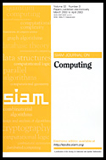
SIAM JOURNAL ON COMPUTING
Exploring Theoretical Breakthroughs in Computing.Welcome to the SIAM Journal on Computing, a premier publication of SIAM Publications dedicated to advancing the field of computational science. Established in 1984, this journal provides a platform for groundbreaking research and theoretical advancements that shape the landscape of both Computer Science and Mathematics. With an impressive impact factor and consistently ranking in Q1 quartiles for its categories, the journal remains an essential resource for scholars looking to contribute to innovative computational theories and methodologies. Although not currently an open-access journal, the SIAM Journal on Computing offers rigorous peer-reviewed articles, ensuring high-quality contributions that appeal to researchers, professionals, and students alike. As we converge towards 2024, this journal continues to play a vital role in influencing future research directions and fostering an academic community devoted to the exploration of computational challenges. Join us in exploring the forefront of computing research!
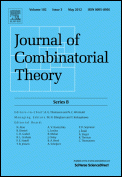
JOURNAL OF COMBINATORIAL THEORY SERIES B
Illuminating the Path of Theoretical AdvancementsJOURNAL OF COMBINATORIAL THEORY SERIES B, published by Academic Press Inc., Elsevier Science, is an esteemed journal within the discipline of combinatorial theory, discrete mathematics, and theoretical computer science. With a rich history since its inception in 1971 and ongoing publication through 2025, this journal has established itself as a pillar in its field, currently holding Q1 category rankings in multiple areas including Computational Theory and Mathematics, Discrete Mathematics and Combinatorics, and Theoretical Computer Science. The journal features cutting-edge research and developments, attracting contributions from both established professionals and emerging scholars. Despite the absence of an open access option, the journal's strong impact reflected in its Scopus ranks—such as being number 16 out of 92 in Discrete Mathematics and Combinatorics (83rd percentile)—signifies its influential role in advancing knowledge and innovation. Researchers seeking to share impactful findings and connect with a vibrant academic community will find the JOURNAL OF COMBINATORIAL THEORY SERIES B an essential resource.
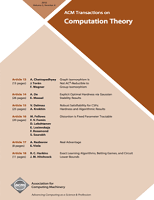
ACM Transactions on Computation Theory
Fostering Collaboration in Cutting-edge Computational Research.ACM Transactions on Computation Theory, published by the Association for Computing Machinery, is a prestigious journal dedicated to advancing the field of computation theory and theoretical computer science. With an ISSN of 1942-3454 and an E-ISSN of 1942-3462, this journal serves as a vital resource for researchers and professionals seeking to explore groundbreaking developments in computational models, algorithms, and their mathematical foundations. The journal's rigorous standards have earned it a significant position within the academic community, as evidenced by its 2023 category quartiles, ranking in the Q1 category for Computational Theory and Mathematics and Q2 for Theoretical Computer Science. Although it operates through traditional subscription access, it maintains a critical role in disseminating cutting-edge research and fostering collaboration among experts in the United States and beyond. As an influential platform, ACM Transactions on Computation Theory is committed to contributing to the ongoing dialogue and advancement of computation theory, making it essential reading for anyone passionate about this dynamic field.